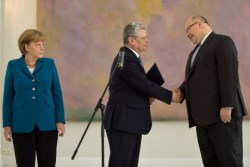New energy minister for Germany
23 May 2012
Germany has a new minister for energy, environment and nuclear safety in Peter Altmaier, a CDU/CSU heavyweight who has been charged with making the country's 'energy transition' a reality.
 |
| Angela Merkel looks on as Joachim Gauk congratulates Peter Altmaier |
German President Joachim Gauck appointed Altmaier as head of the Ministry for the Environment, Nature Conservation and Nuclear Safety yesterday at Bellevue Castle, standing alongside Chancellor Angela Merkel. Gauk said that Altmaier would have to concentrate first on the "hard graft" required to meet the "major challenges" of revolutionising Germany's electricity supply.
At this time last year the country closed eight large reactors in response to the Fukushima accident, with a plan to close the remaining 15 by 2022. A policy was then announced to double the output of renewables by 2020 to reach 35% of generation, while cutting its carbon dioxide emissions by 40% compared to 1990 levels. Nevertheless, some 19 fossil power plants remain under construction in Germany.
This upheaval in the energy landscape, combined with taxes to pay for renewable subsidies, has given Germany some of Europe's highest prices for power. Industrial users are shielded from this to a certain extent, but the price issue has been named by metal industry bodies as instrumental in the recent bankruptcy of Voerde, Germany's third-largest aluminium producer.
Carbon dioxide figures for 2011 showed that emission from Germany's power sector grew by 2-6% compared to the year before, while the Bundesnetzagentur (Federal Network Agency) has reported major stresses on the power system during February. Transmission lines were used to full capacity and there were "massive shortfalls" in grid balance. Reserve power plants had to be used, "to prevent electricity customers being taken off the grid," said the agency. "These were up to 1295 MWe of cold reserve, including 360 MWe from Germany and 935 MWe from Austria as well as emergency reserves amounting to several hundred MWe obtained from abroad." The same situation is expected next winter, it said, exacerbated by the retirement of old fossil power plants in the south that will necessitate extensive upgrades to grid capacity.
Altmaier has a background in law and European affairs and has served as parliamentary state secretary for the CDU/CSU party pairing, working to keep members to the party line. He replaces Norbert Röettgen, who lost favour after leading Merkel's party to defeat in a recent regional election.
Researched and written
by World Nuclear News